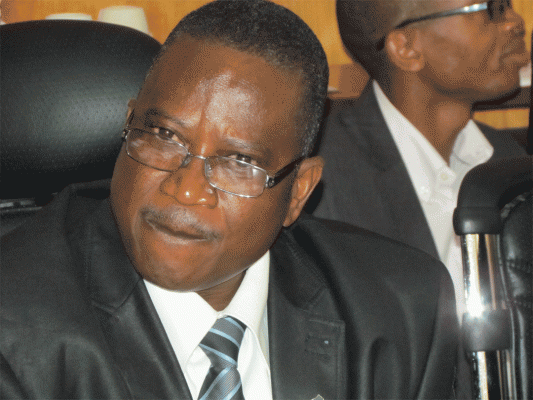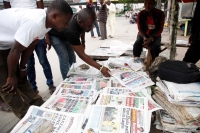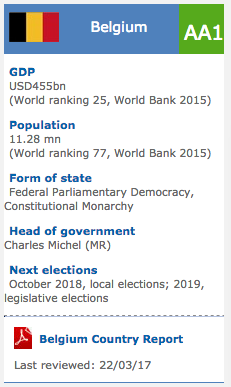Nigeria: Oladele Amoda CEO
2012/12/06

Nigeria has 5,900 megawatts of installed generating capacity. Nevertheless, the country is only able to generate around 4,000MW. Most facilities are poorly maintained. Infrastructure development is one of the largest focuses of the current government and it is estimated that by 2012, 90 % of the country will be covered.
What are the strategies and policies the Ministry of Power is actually implementing right now? What are the current challenges in the sector?
The power sector, for now, is having a lot of challenges ranging from aged infrastructure to inadequate supply of gas to run the existing power plants and other maintenance challenges. Nevertheless, with the current government’s resolve to revamp the sector in line with the provisions of the Electric Power Sector Reform Act, there is a lot of hope that the electricity market in Nigeria will soon blossom. Secondly, the on-going privatisation process is expected to open opportunities and pave the way for sustained and consistent investment in the sector to expand the existing infrastructure and make electricity available to over 90% of the country. The on-going NIPP (National Integrated Power Projects) coupled with rural electrification projects will complement these efforts.
Nigeria’s aim is to experience for the year 2020 uninterrupted power supply (up to 40,000MW as South Africa has). Do you see this goal as attainable and what is needed?
The goal of providing uninterrupted electricity supply to Nigerians by 2020 is achievable going by the current government’s efforts to revamp the power sector. With amount the several IPP, NIPP and rehabilitation projects going on at different locations, coupled with short and medium term emergency power projects coming up, it is certain that the target of 40,000MW will be achieved. The sector is already opened up for investors both in the power and the gas sectors and extra will be investing in coal, solar and even nuclear power projects.
Before starting on the expansion of the facilities and the network it has been noted that it would be extra adequate to invest in the existing plants in order to modernise them. How do you see the current infrastructure network?
The existing electricity supply infrastructure (power plants, transmission and distribution networks) are in a poor national and require largest maintenance/rehabilitation works to put them back into good working condition. Presently, the Federal Government is already investing in largest maintenance and rehabilitation of existing power plants and the grid network to bring them back to normal operating condition. Some of the old plants are being retrofitted and several ones under rehabilitations will be delivered soon.
The electricity tariff is another significant issue. In an interview with Upper Reach, Dr. Sam Amadi (CEO of the Nigerian Electricity Regulatory Commission) stated that “by the end of the year a second multi-year tariff order will be addressed, making operators extra efficient and as well extra profitable.” Do you agree?
Electricity, just like any other product, must be appropriately priced for the industry/market to function entirely and efficiently. By NERC’s mandate, the electricity tariff is to undergo a minor review from time to time and a largest review each five years under the MYTO arrangement. Accordingly, MYTO 2 represents the largest tariff review being undertaken by NERC to have a cost reflective pricing that will stimulate interest of investors wishing to enter the electricity market in Nigeria.
Eko Electricity Distribution Company is one of the majority significant assets in the power sector, serving the country’s “Centre of Excellence”, the business capital of Lagos. What have been the steps taken since the new government to improve efficiency and turnaround time, in order to serve its customers better and shore up its revenue base?
Eko Electricity Distribution Company actually represents a very significant a lot of in the power sector by virtue of its location and coverage area. Our service territory covers areas with a large concentration of high net-worth corporate and individual customers with huge revenue potentials. The current government, through the budget appropriations and other intervention funding, has invested in the distribution network rehabilitation/expansion projects aimed at stabilising and improving service delivery to our esteemed customers. The improved service delivery will, in turn, translate to improved revenue generation.
Currently the public power sector assets are up for privatisation and have generated a great interest among the international investor community, with over 300 companies filing an Expression of Interest. The potential in this sector is enormous. At what stage is the privatisation and what are the challenges? How can we make investors understand the opportunities?
Privatisation of the power sector, which will enable the much-needed investment in the sector, is at an advanced stage. The Bureau for Public Enterprises has almost concluded the process and a tentative month for the emergence of winners is set for October. It is expected that new investors will start operations before the end of the year 2012. Most of the challenges have been surmounted leaving extra or less the labour issue, which is almost concluded. The whole process is very transparent and the prospective investors and members of the public are carried along at each stage. The potential investors are already aware of the huge opportunities that will come from their investment.
Please tell our readers a bit about yourself. You graduated from Memphis National University (now University of Memphis), Tennessee, in the USA with a Bachelor of Science degree in Electrical Engineering. Prior to your promotion to CEO of Eko Electricity Distribution Company you were already involved in the management as Deputy CEO. What has prepared you to excel your current position and what is the legacy you would like to leave behind?
I am a professional electrical engineer, a fellow of the Nigeria Society of Engineers, a member of the Institution of Engineering and Technology (MIET) of the United Kingdom, member of the Institute of Electrical and Electronics Engineers (MIEEE) USA, and a fellow of the Nigerian Institute of Management (FNIM).
Besides my bachelor’s degree in Electrical Engineering, I as well earned a Masters in Science in Electrical Engineering from the University of Lagos, Nigeria before which I had an MBA in Management from ESUT Business School, Enugu Nigeria. I rounded up my educational pursuit with another Master of Science degree in Organisational Leadership from Regis University in Denver, Colorado. I have passion for hard work, self-development, and staff mentoring. The legacy I hope to leave behind will hinge on an improved distribution network, efficient business process, positively re-orientated workforce, and an entrenched system for better customer services.
What is your final message to the readers of this statement?
The electricity industry/sector in Nigeria has a bright next for customers and investors. The efforts of the Federal Government to revamp the industry and drive the privatisation process will create tremendous opportunities for investors and drive economic increase in Nigeria. Everybody should wholeheartedly embrace the transformation schedule of Mr. President, Dr Ebele Jonathan GCON, GCFR, and his team. The next is bright for Nigeria.
- Related Articles

Africa's Relationship With China Is Ancient History
2017/07/02 In 2002 South Africa's Parliament unveiled a digital reproduction of a map - of China, the Middle East and Africa - that some speculated could be the initial map of the African continent. The Da Ming Hun Yi Tu - the Comprehensive Map of the Great Ming Empire - was drawn up around 1389 during the Ming Dynasty, according to historian Hyunhee Park.
Africa: Making Things Happen at the Bank - 'Not a Talk Shop' - Akin Adesina
2017/07/02 Dr. Akinwumi Adesina is focusing on five areas to achieve the African and world goals for a prosperous continent since becoming president of the African Development Bank - Africa's major public financial institution in September 2015. He was a keynote speaker at this month's Corporate Council on Africa's U.S.- Africa Business Summit in Washington D.C. and moderated a lively panel with five African government ministers. He as well received the Gene White Lifetime Succcess Award from the World Child Nutrition Foundation. This week, he was named the 2017 recipient of the World Food Prize, a prestigious honor that includes a $250,000 award. In an interview in Washington, DC, Adesina discussed the Development Bank's ambitious schedule and his vision for attracting the increase capital Africa needs. Posting questions for AllAfrica was Noluthando Crockett-Ntonga.
Climate change laws around the world
2017/05/14 There has been a 20-fold increase in the number of global climate change laws since 1997, according to the most comprehensive database of relevant policy and legislation. The database, produced by the Grantham Research Institute on Climate Change and the Environment and the Sabin Center on Climate Change Law, includes more than 1,200 relevant policies across 164 countries, which account for 95% of global greenhouse gas emissions.
Inflation, meanwhile, had climbed to an 11-year high by October.
2017/04/17 Lower hydrocarbons revenues, tight capital controls and currency volatility combined to make 2016 a challenging year for Nigeria. By December the country was in recession, facing its initial full-year contraction for almost three decades, with the IMF expecting Nigeria’s economy to shrink by 1.7%. Inflation, meanwhile, had climbed to an 11-year high by October. However, the outlook for 2017 appears brighter for what is still Africa’s major economy by GDP.Beyond the obvious: a celebration of the Nama Riel dance in Karoo, South Africa.
2016/07/23 This month actor Louise Linton caused a social media storm at the same time as an extract of her African gap year memoir was published by the Telegraph and was widely panned online for being a tick inventory of cliches and stereotypes in the way the west has always liked to portray the continent. On Twitter, #LintonLies, set up by Zambian writer Lydia Ngoma, was trending as people started to pour scorn on Linton’s version of certain events and her take on life there. Think: “close encounters with lions”, “brutal tales of rape and murder,” and 12-inch long spiders, which would be terrifying, though they only exist in Laos.
- Nigeria News
-
- NIGERIA: The Federal Government Begs Dangote to Complete Refinery Before 2019
- BOTSWANA: Children on the move from Africa do not first aim to go to Europe, new UNICEF study shows
- BOTSWANA: WHO lauds Africa’s progress in malaria, HIV control
- ETHIOPIA: Envoy cautions Nigerians on currency declaration in Ethiopia
- SOUTH AFRICA: South African President, Jacob Zuma
- NIGERIA: Osinbajo tasks African petroleum-producing countries on reforms
- Trending Articles
-
- ITALY: Italy seizes NGO rescue boat for allegedly aiding illegal migration
- CHINA: China energy regulator raises targets for curbing coal-fired power
- GERMANY: Germany agrees measures to cut diesel pollution
- MONTENEGRO: Go West, VP Pence tells Balkan leaders
- CHILE: Chile presidential candidate Pinera would modify pension system
- RUSSIA: New U.S. sanctions amount to 'full-scale trade war'




.gif?1356023993)






